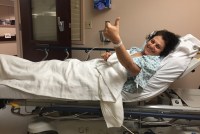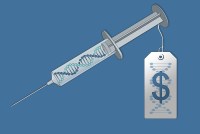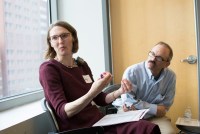Latest KFF Health News Stories
Readers And Tweeters Slice And Dice Precision Medicine, Step Therapy
Kaiser Health News gives readers a chance to comment on a recent batch of stories.
La “medicina de precisión” para combatir el cáncer no siempre logra su objetivo
Estas terapias focalizadas, que ajustan la medicina a la genética de la enfermedad, no tienen el éxito que los médicos, y el público en general, esperan.
Much Touted For Cancer, ‘Precision Medicine’ Often Misses The Target
Doctors and hospitals love to talk about the patients they’ve saved with precision medicine, and reporters love to write about them. But the people who die still vastly outnumber the rare successes.
Doctor To The Stars Disciplined Over Use Of Controversial Menopause Therapy
Dr. Prudence Hall has made a name for herself in the field of “bioidentical hormones” — plant-based compounds purportedly customized for each patient’s needs. Experts say the popular approach is unproven; California regulators say she was grossly negligent in her care of two patients.
Must-Reads Of The Week From Brianna Labuskes
Newsletter editor Brianna Labuskes wades through hundreds of health articles from the week so you don’t have to.
Californians Living Longer With Cancer — Some Longer Than Others
A new study from the University of California-Davis shows a significant increase in five-year survival rates for more than 20 types of cancer, but with significant disparities by race, ethnicity and economic status. That is in line with the national trend.
For Nursing Home Patients, Breast Cancer Surgery May Do More Harm Than Good
A new study of 6,000 older patients shows little gain from surgeries for breast cancer.
McCain’s Complicated Health Care Legacy: He Hated the ACA. He Also Saved It.
The six-term Arizona senator, who died Saturday, took on some of health care’s goliaths, such as the tobacco industry and insurance companies, in addition to the health law.
Staggering Prices Slow Insurers’ Coverage Of CAR-T Cancer Therapy
Some state Medicaid programs are not paying for the procedures, and Medicare’s complicated payment rates have hospitals concerned that it will not cover all the costs.
Geriatric Assessments Could Fine-Tune Cancer Care For Older Adults
The American Society of Clinical Oncology issued a new guideline that recommends adults 65 and older receive a geriatric assessment when considering or undergoing chemotherapy.
Must-Reads Of The Week From Brianna Labuskes
KHN’s newsletter editor, Brianna Labuskes, wades through hundreds of health articles from the week so you don’t have to.
Must-Reads Of The Week From Brianna Labuskes
KHN’s newsletter editor, Brianna Labuskes, wades through hundreds of health articles from the week so you don’t have to.
Listen: What You Need To Know About The News On Breast Cancer And Chemo
KHN senior correspondent Liz Szabo joins a panel on WAMU’s radio show “1A” to discuss new insight into breast cancer treatment.
¿Quisieras que te hicieran pruebas genéticas como parte de tu chequeo anual?
El debate se generó cuando un sistema de salud anunció que comenzaría a secuenciar el ADN de 1,000 pacientes, como parte de un proyecto de atención primaria.
Are You And Your Primary Care Doc Ready To Talk About Your DNA?
The Pennsylvania-based health chain Geisinger plans to offer DNA sequencing as part of regular patient care.
Indocumentada y con cáncer: entre la muerte y la deportación
¿Qué sucede cuando un inmigrante indocumentado tiene un diagnóstico potencialmente mortal? Depende mucho de en dónde viva.
Choosing Between Death And Deportation
What happens when an undocumented immigrant has a life-threatening diagnosis? Much depends on where the person lives. And even in states with generous care for a dire illness, a patient can face difficult life-and-death choices.
Best Reads Of The Week From Brianna Labuskes
Newsletter editor Brianna Labuskes, who reads everything on health care to compile our daily Morning Briefing, offers the best and most provocative stories for the weekend.
‘Rapid Autopsy’ Programs Seek Clues To Cancer Within Hours Of Death
More than a dozen centers nationwide now ask terminal patients to allow speedy study of the diseases that kill them.
Médicos aprenden a hablar con sus pacientes sobre el final de la vida
Una guía busca ayudar a los médicos a conversar con sus pacientes terminales sobre un tema crítico que no siempre se aborda de la mejor manera.




















